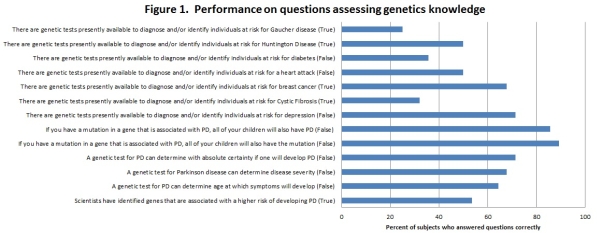Session Information
Date: Tuesday, June 21, 2016
Session Title: Parkinson's disease: Genetics
Session Time: 12:30pm-2:00pm
Location: Exhibit Hall located in Hall B, Level 2
Objective: To determine interest in genetic testing in Parkinson’s disease (PD) patients with deep brain stimulation (DBS).
Background: Approximately 27% of early-onset PD patients with DBS carry a genetic mutation in one of three genes: glucocerebrosidase (GBA), leucine-rich repeat kinase 2 (LRRK2), and parkin (PRKN). Genotype-phenotype correlations have the potential to inform disease progression as well as DBS outcomes, particularly benefits and side effects of DBS. As the relevance of genetic testing on clinical outcomes becomes better defined, it is important to understand patients knowledge of genetics, whether or not patients would choose to undergo genetic testing and which factors influence their desire to do so.
Methods: The Genetic Attitude Questionnaire (GAQ) assesses genetic knowledge, patient desire for genetic testing, and reasons for testing. The GAQ was administered to 28 non-demented PD patients after DBS (MMSE >24), who were unaware of their genetic mutation status. Genetic knowledge, the desire for genetic testing, and reasons for testing were quantified.
Results: Average age (n=28) was 62.4±5.7 and 78.6% were men. 18% reported a family history of PD and of these, 40% believed PD is hereditary. Of the 82% of patients without a family history of PD, only 4.3% believed PD is hereditary. Understanding that there is no clinical role for genetic testing at the present time, nine subjects (32.1%) would still like to have genetic testing, 6 subjects (21.4%) definitely did not want to be tested, and 13 subjects (46.4%) were undecided. However, 93% of subjects would want genetic testing if it would predict benefit or side effects of a particular medication or intervention such as DBS. Performance on questions assessing genetic knowledge (Figure 1) show that the majority of patients answered PD genetics questions correctly. 
Conclusions: Genetic testing is widely desired by PD patients with DBS if it is able to influence clinical decision making. The majority of PD patients have a basic understanding of PD genetics. Further studies are warranted to better understand the factors that influence the desire to obtain genetic testing, especially if testing is offered prior to DBS surgery.
To cite this abstract in AMA style:
G. Pal, E. Tam, R. Bhavsar, C. Timms, L. Verhagen, D. Hall, K. Marder. Interest in genetic testing in Parkinson’s disease patients with deep brain stimulation [abstract]. Mov Disord. 2016; 31 (suppl 2). https://www.mdsabstracts.org/abstract/interest-in-genetic-testing-in-parkinsons-disease-patients-with-deep-brain-stimulation/. Accessed March 3, 2026.« Back to 2016 International Congress
MDS Abstracts - https://www.mdsabstracts.org/abstract/interest-in-genetic-testing-in-parkinsons-disease-patients-with-deep-brain-stimulation/
